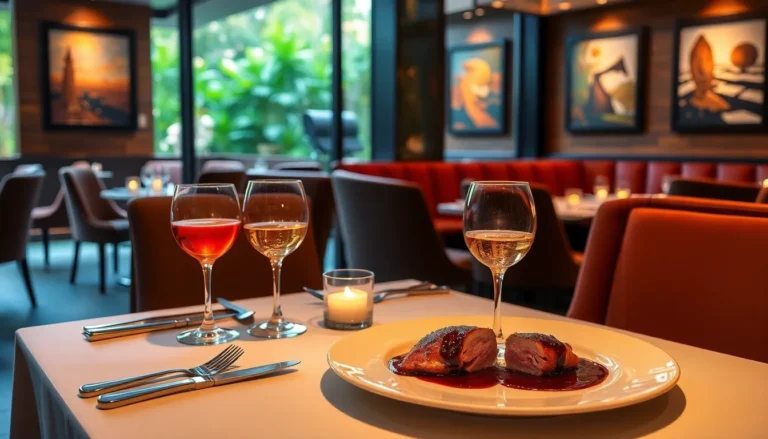Table of Contents
ToggleIn a world where food is love and dining out is an adventure, restaurant reviews serve as the trusty compass guiding hungry souls to culinary bliss. Whether it’s a hidden gem tucked away in a bustling city or a trendy hotspot boasting a Michelin star, these reviews can make or break a dining experience. After all, who wants to risk a night of soggy fries and questionable service when there’s a world of flavor waiting to be discovered?
The Importance Of Restaurant Reviews
Restaurant reviews significantly influence diners’ choices. They provide insight into various culinary experiences and help establish expectations.
Building Trust With Customers
Trust develops through consistent, honest feedback. Diners rely on reviews to gauge service, food quality, and atmosphere. Positive experiences shared by others enhance credibility for a restaurant. Customers appreciate transparency, which encourages them to try new places. Establishments that engage with reviewers foster relationships, showing that they value feedback. Such interactions can lead to repeat patrons and increased loyalty.
Influencing Decision-Making
Decision-making hinges on information availability. Restaurant reviews guide diners by presenting both pros and cons. Many potential customers consider ratings before making reservations, with higher ratings often correlating with increased patronage. Menus and photos posted alongside reviews offer helpful visuals that attract diners. Reviews can shape perceptions, steering customers toward certain cuisine types or dining experiences. Ultimately, insights shared by others influence the choices diners make, impacting restaurant success.
Types Of Restaurant Reviews
Various types of restaurant reviews provide unique insights for potential diners. Understanding these categories helps in interpreting feedback effectively.
Professional Critiques
Professional critiques are typically conducted by food critics or culinary experts. These individuals often possess extensive experience and a deep understanding of dining standards. Their assessments cover food quality, presentation, and service. This level of expertise offers a reliable, in-depth perspective. Many critics publish their reviews in reputable publications or specialized food blogs, adding credibility. Readers frequently rely on these critiques to gauge the overall dining experience at a restaurant. Reviews often include detailed descriptions of specific dishes, allowing customers to make informed choices.
User-Generated Feedback
User-generated feedback comes from everyday diners sharing their personal dining experiences. These reviews can be found on various platforms, including social media and restaurant websites. Users often describe their meals, service quality, and ambiance in relatable language. This feedback is valuable as it reflects a wide range of opinions and experiences. Many potential customers trust user-generated reviews, finding insights into current restaurant offerings. With detailed ratings and comments, these reviews influence dining decisions significantly. By being candid, users help build a community around shared dining experiences.
Platforms For Restaurant Reviews
Restaurant reviews are plentiful across various platforms, aiding diners in making informed choices. Specific sites and social media play significant roles in shaping these culinary discussions.
Popular Review Sites
Yelp ranks among the top choices, providing detailed user experiences and star ratings. TripAdvisor offers comprehensive listings, including traveler photos and reviews. Google Reviews allows users to leave quick feedback directly from search results, enhancing visibility. Zomato focuses on food quality and ambiance, featuring menus and staff interaction insights. Each platform serves a distinctive purpose, contributing to diners’ understanding of local eateries.
Social Media Influence
Instagram plays a vital role in showcasing restaurant dishes through visually appealing images. Users post tantalizing photos, often drawing attention to trending spots. Facebook fosters community feedback, enabling diners to share experiences and recommendations. Twitter allows for concise impressions, where users post timely thoughts on new openings or favorite dishes. Engaging with these platforms also creates opportunities for restaurants to market themselves directly to potential customers.
How To Write Effective Restaurant Reviews
Effective restaurant reviews convey clear, objective evaluations of dining experiences. Essential elements help readers make informed decisions.
Key Elements To Consider
When writing a review, consider the food quality, presentation, and service. Evaluating the atmosphere adds depth to the experience. Think about the menu diversity and pricing, as these factors influence overall satisfaction. Mentioning specific dishes rather than generic terms offers clarity. Additionally, describe the cleanliness of the restaurant, which affects diners’ comfort. Include personal experiences and unique aspects to engage readers. Using a structured format can enhance readability, while concise summaries provide quick insights.
Tips For Authenticity
Authenticity builds trust among readers. Sharing personal anecdotes helps create a relatable narrative. Avoid exaggerations and focus on true experiences to maintain credibility. Including both strengths and weaknesses offers a balanced perspective. Engaging with other reviewers can enhance community trust and connections. Using clear language allows readers to understand your message easily. Keeping a friendly tone makes the review more enjoyable, encouraging interaction. Readers appreciate honesty, and being genuine fosters loyalty among followers.
Restaurant reviews play a vital role in shaping the dining landscape. They not only guide diners in their choices but also foster a sense of community among food lovers. By sharing experiences and insights, both professional critics and everyday diners contribute to a richer understanding of what each restaurant has to offer.
As diners continue to seek authentic and trustworthy feedback, the importance of well-crafted reviews will only grow. Engaging with various platforms allows individuals to discover new culinary delights while supporting local businesses. Embracing the art of writing thoughtful reviews can enhance the dining experience for everyone involved.








